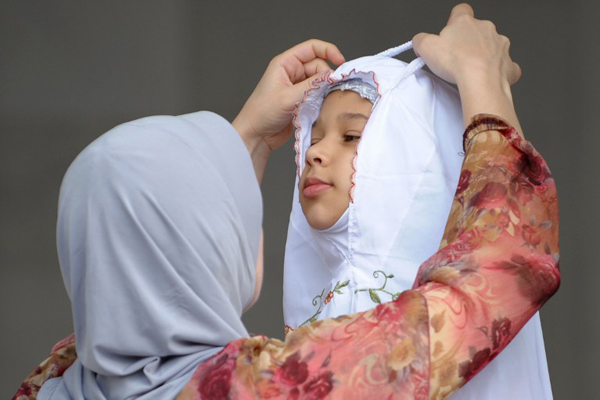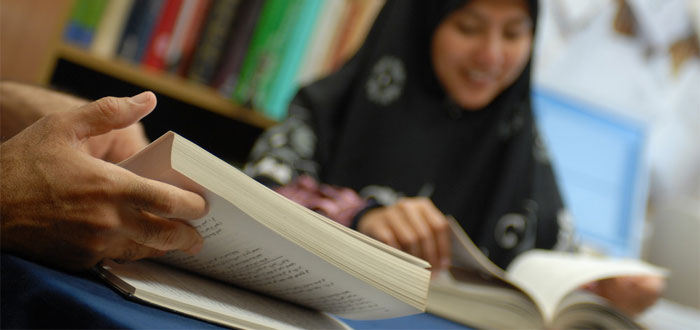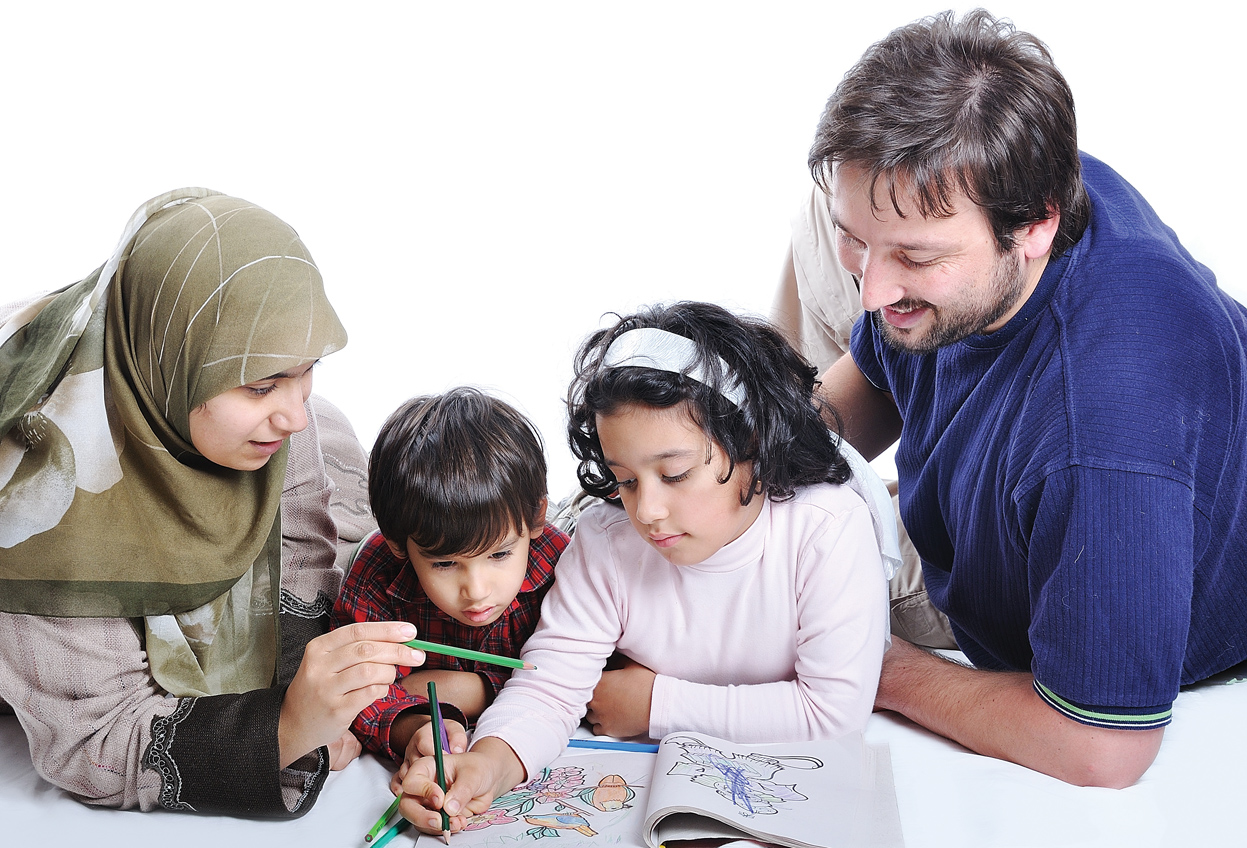What is Allah’s Favorite Form of Hijab for a Muslim Woman?
Islam has strongly emphasized the concept of decency and modesty in the interaction between members of the opposite sex. Dress code is part of that overall teaching. There are two verses in the Qur’an in which Almighty Allah talks about the issue of decency and hijab as defined earlier.
The First Verse
In Chapter 24 known as an-Nur (the Light), in verse 30, Allah commands Prophet Muhammad as follows:
قُلْ لِلْمُؤْمِنِيْنَ يَغُضُّوْا مِنْ أَبْصَارِهِمْ وَ يَحْفَظُوْا فُرُوْجَهُمْ, ذَلِكَ أَزْكَى لَهُمْ.
“Say to the believing men that: they should cast down their glances and guard their private parts (by being chaste). This is better for them.”
This is a command to Muslim men that they should not lustfully look at women (other than their own wives); and in order to prevent any possibility of temptation, they are required to cast their glances downwards. This is known as “hijab of the eyes”.
Then in the next verse, Allah commands the Prophet to address the women:
قُلْ لِلْمُؤْمِنَاتِ يَغْضُضْنَ مِنْ أَبْصَارِهِنَّ وَ يَحْفَظْنَ فُرُوْجَهُنَّ…
“Say to the believing women that: they should cast down their glances and guard their private parts (by being chaste)…”
This is a similar command as given to the men in the previous verse regarding “hijab of the eyes”.
This hijab of eyes is similar to the teaching of Jesus where he says, “You have heard that it was said by them of old time, you shall not commit adultery. But I say unto you, That whosoever looks on a woman to lust after her has committed adultery with her already in his heart.”
So if you see a Muslim casting his/her eyes downwards when he/she is talking to a member of opposite sex, this should not be considered as rude or an indication of lack of confidence — he/she is just abiding by the Qur’anic as well as Biblical teaching.
* * * * *
After “hijab of the eyes” came the order describing the dress code for women:
وَ لاَ يُبْدِيْنَ زِيْنَتَهُنَّ إِلاَّ مَا ظَهَرَ مِنْهَا وَ لْيَضْرِبْنَ بِخُمُرِهِنَّ عَلىَ جُيُوْبِهِنَّ…
“…and not display their beauty except what is apparent, and they should place their khumur over their bosoms…”
There are two issues about this sentence.
(1) What is the meaning of “khumur” used in this verse?
Khumur خُمُرٌ is plural of khimarخِمَارٌ , the veil covering the head. See any Arabic dictionary like Lisanu ’l-‘Arab, Majma‘u ’l-Bahrayn or al-Munjid.
Al-Munjid, which is the most popular dictionary in the Arab world, defines al-khimar as “something with which a woman conceals her head —ما تغطى به المرأة رأسها .” Fakhru ’d-Din al-Turayhi in Majma‘u ’l-Bahrayn (which is a dictionary of Qur’anic and hadith terms) defines al-khimar as “scarf, and it is known as such because the head is covered with it.”
So the word khimar, by definition, means a piece of cloth that covers the head.
(2) Then what does the clause “placing the khumur over the bosoms” mean?
According to the commentators of the Qur’an, the women of Medina in the pre-Islamic era used to put their khumur over the head with the two ends tucked behind and tied at the back of the neck, in the process exposing their ears and neck. By saying that, “place the khumur over the bosoms,” Almighty Allah ordered the women to let the two ends of their headgear extend onto their bosoms so that they conceal their ears, the neck, and the upper part of the bosom also.
This is confirmed by the way the Muslim women of the Prophet’s era understood this commandment of Almighty Allah. The Sunni sources quote Ummu ’l-mu’minin ‘A’isha, the Prophet’s wife, as follows: “I have not seen women better than those of al-Ansar (the inhabitants of Medina): when this verse was revealed, all of them got hold of their aprons, tore them apart, and used them to cover their heads…”
The meaning of khimar and the context in which the verse was revealed clearly talks about concealing the head and then using the loose ends of the scarf to conceal the neck and the bosom. It is absurd to believe that the Qur’an would use the word khimar (which, by definition, means a cloth that covers the head) only to conceal the bosom with the exclusion of the head! It would be like saying to put on your shirt only around the belly or the waist without covering the chest!
Finally the verse goes on to give the list of the mahram – male family members in whose presence the hijab is not required, such as the husband, the father, the father-in-law, the son(s), and others.
The Second Verse
In Chapter 33 known as al-Ahzab, verse 59, Allah gives the following command to Prophet Muhammad:
يَا أَيُّهَا النَّبِيُّ, قُلْ لأَزْوَاجِكَ وَ بَنَاتِكَ وَ نِسآءِ الْمُؤْمِنِيْنَ: يُدْنِيْنَ عَلَيْهِنَّ مِنْ جَلاَبِيْبِهِنَّ…
“O Prophet! Say to your wives, your daughters, and the women of the believers that: they should let down upon themselves their jalabib.”
What is the meaning of “jalabib”?
Jalabib جَلاَبِيْبٌ is the plural of jilbab جِلْبَابٌ , which means a loose outer garment. See any Arabic dictionary like Lisanu ’l-‘Arab, Majma‘u ’l-Bahrayn or al-Munjid.
Al-Munjid, for instance, defines jilbab as “the shirt or a wide dress—القميص أو الثوب الواسع.” While al-Turayhi, in Majma‘u ’l-Bahrayn, defines it as “a wide dress, wider than the scarf and shorter than a robe, that a woman puts upon her head and lets it down on her bosom…”
This means that the Islamic dress code for women does not only consist of a scarf that covers the head, the neck and the bosom; it also includes the overall dress that should be long and loose.
So, for instance, the combination of a tight, short sweater with tight-fitting jeans with a scarf over the head does not fulfill the requirements of the Islamic dress code.
Source: “Hijab, the Muslim Women’s Dress, Islamic or Cultural?” written by Sayyid Muhammad Rizvi










